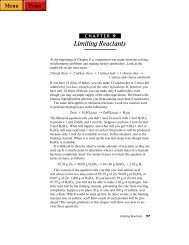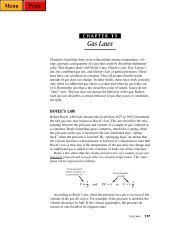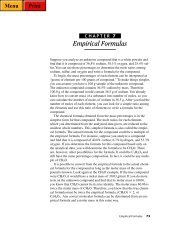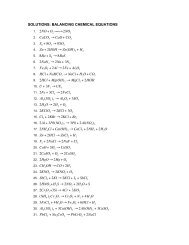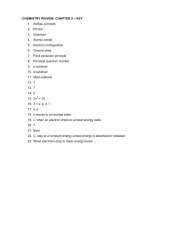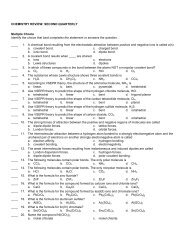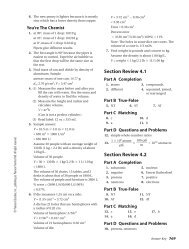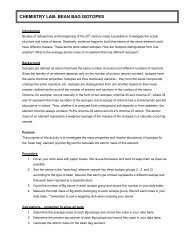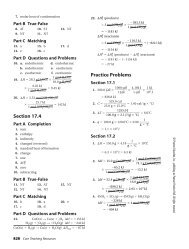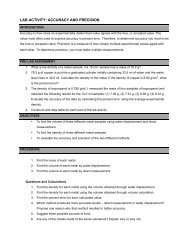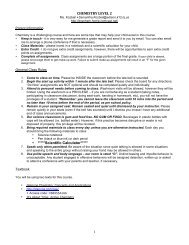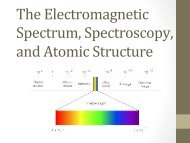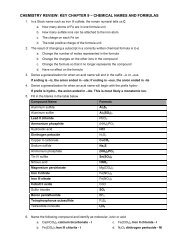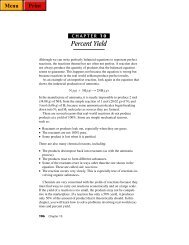PUBLIC SCHOOL OF EDISON TOWNSHIP SCIENCE SAFETY RULES
PUBLIC SCHOOL OF EDISON TOWNSHIP SCIENCE SAFETY RULES
PUBLIC SCHOOL OF EDISON TOWNSHIP SCIENCE SAFETY RULES
Create successful ePaper yourself
Turn your PDF publications into a flip-book with our unique Google optimized e-Paper software.
ACCIDENTS AND INJURIES<br />
27. Report any accident (spill, breakage, etc.) or injury (cut, burn, etc.) to the instructor immediately, no matter how<br />
trivial it may appear.<br />
28. If a chemical should splash in your eye(s) or on your skin, immediately flush with running water from the eyewash<br />
station or safety shower for at least 20 minutes. Notify the instructor immediately.<br />
HANDLING CHEMICALS<br />
29. All chemicals in the laboratory area are to be considered dangerous. Do not touch, taste, or smell any<br />
chemicals unless specifically instructed to do so. The proper technique for smelling chemical fumes will be<br />
demonstrated to you.<br />
30. Check the label on chemical bottles twice before removing any of the contents. Take only as much chemical as<br />
you need.<br />
31. Never return unused chemicals to their original containers.<br />
32. When transferring chemicals from one container to another, hold the containers away from your body.<br />
33. Acids must be handled with extreme care.<br />
34. Handle flammable hazardous liquids over a pan to contain spills. Never pour flammable liquids anywhere near<br />
an open flame or source of heat.<br />
35. Never remove chemicals or other materials from the laboratory area.<br />
36. Take great care when transferring chemicals from one part of the laboratory area to another. Hold the container<br />
securely and walk carefully.<br />
HANDLING GLASSWARE AND EQUIPMENT<br />
37. Never handle broken glass with your bare hands. Use a brush and dustpan to clean up broken glass.<br />
Place broken or waste glassware in the designated glass disposal container.<br />
38. Fill wash bottles only with distilled water and use only as intended, e.g., rinsing glassware and equipment, or<br />
adding water to a container.<br />
39. When removing an electrical plug from its socket, grasp the plug, not the electrical cord. Hands must be<br />
completely dry before touching an electrical switch, plug, or outlet.<br />
40. Examine glassware before each use. Never use chipped or cracked glassware. Never use dirty glassware.<br />
41. Report damaged electrical equipment immediately. Look for things such as frayed cords, exposed wires, and<br />
loose connections. Do not use damaged electrical equipment.<br />
42. Do not immerse hot glassware in cold water; it may shatter.<br />
HEATING SUBSTANCES<br />
43. Exercise extreme caution if using an alcohol burner. Take care that hair, clothing, and hands are a safe distance<br />
from the flame at all times. Do not put any substance into the flame unless specifically instructed to do so. Never<br />
reach over an exposed flame. Light gas or alcohol burners only as instructed by the teacher. Never leave a lit<br />
burner unattended. Never leave anything that is being heated or is visibly reacting unattended.<br />
44. Always turn the burner or hot plate off when not in use.<br />
45. You will be instructed in the proper method of heating and boiling liquids in test tubes. Do not point the open end<br />
of a test tube being heated at yourself or anyone else.<br />
46. Use tongs or heat-protective gloves if necessary. Heated metals and glass remain very hot for a long time. They<br />
should be set aside to cool and picked up with caution.<br />
47. Never look into a container that is being heated.<br />
48. Do not place hot apparatus directly on the laboratory desk. Always use an insulating pad. Allow plenty of time<br />
for hot apparatus to cool before touching it.<br />
Modeled after the Flinn Scientific Inc. Student Safety Contract



